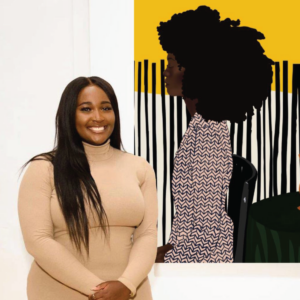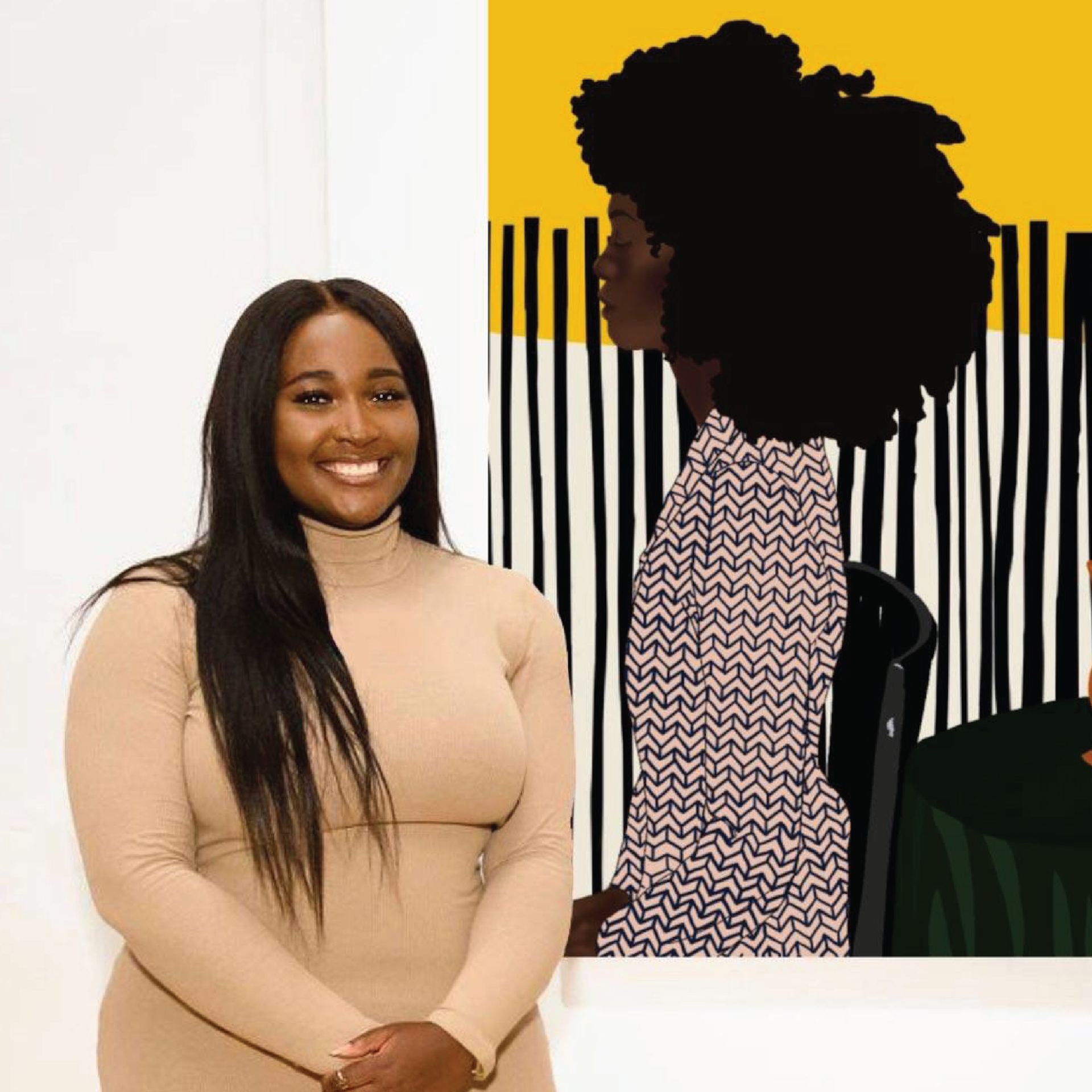Uzo Njoku
Obstacles are often thrown in our life to teach us, grow us, and focus. It garners creativity and peace, once you get to the greener grass. Without obstacles, there is no perspective or change — the sooner we embrace obstacles, the sooner we get around to living. Uzo Njoku’s Nigerian upbringing gave her a unique outlook that stoked her breadth of interests from statistics to studio art. And yet, they work harmoniously in the work she creates today as a painter, pattern maker, and product designer. Inspired by the powerful and successful women of her life, she created her coloring book, The Bluestocking Society, that focused on inspirational women of color — and jumpstarted her career. “I will have women doing anything; they could be cooking, cleaning — there’s nothing that undermines you as a woman or makes you lesser than somebody else just because you want to stay home.”
Growing up, Uzo dreamt of being a fashion designer. Or an architect. But her father said, “be a lawyer.” “But I hate reading.” “Be a doctor.” “But I hate blood.” As worried parents do, and especially those who migrated and had to rebuild their lives, they wanted Uzo to live life comfortably. Moving to the United States as a 7 year old meant her and her siblings being separated from their father for two and half years while her mother went from a banker in Nigeria to scrubbing floors and cleaning houses in the United States. “They both finished their Bachelor’s, my dad was at the top of his class [in medical school], but when you come to America, those degrees meant nothing. We had to start all over. My mom took care of three kids by herself when we first came over so it made me understand what it is to be a single mother. She was still married but her husband was away, I can’t imagine how it is for actual single mothers.” After years of work, her parents own a healthcare business and wanted the best for Uzo.
 As a natural in math, Uzo was set on becoming an actuarial scientist, studying statistics at the University of Virginia. But one day, she decided to decorate her house’s white walls with paint. “I look back at it now and I laugh because it’s so rudimentary. I had so much support from my friends when I posted, they said, ‘Oh this is so great, can I get one?’ And so I started doing small little paintings for twenty bucks and that’s how it started.” The rush she felt from the paint leaving her brush to create a vibrant work was enough for her to change her major to studio art. While in the program, Uzo struggled on securing funding for her work. “At the end of the day, they don’t care if you can create amazing paintings. It’s about being able to academically write about your work. I come from statistics, I’m a very technical artist and create worth based on color scheme composition. I have no grandeur story for why I painted what I painted. It doesn’t even make sense to me writing that because everyone has different perspectives of what they see so who am I to come in and give you a notion in your head. There’s some things you don’t need to know. I’m always trying to play with the ambiguity of the pieces as well.”
As a natural in math, Uzo was set on becoming an actuarial scientist, studying statistics at the University of Virginia. But one day, she decided to decorate her house’s white walls with paint. “I look back at it now and I laugh because it’s so rudimentary. I had so much support from my friends when I posted, they said, ‘Oh this is so great, can I get one?’ And so I started doing small little paintings for twenty bucks and that’s how it started.” The rush she felt from the paint leaving her brush to create a vibrant work was enough for her to change her major to studio art. While in the program, Uzo struggled on securing funding for her work. “At the end of the day, they don’t care if you can create amazing paintings. It’s about being able to academically write about your work. I come from statistics, I’m a very technical artist and create worth based on color scheme composition. I have no grandeur story for why I painted what I painted. It doesn’t even make sense to me writing that because everyone has different perspectives of what they see so who am I to come in and give you a notion in your head. There’s some things you don’t need to know. I’m always trying to play with the ambiguity of the pieces as well.”
So when her family first settled in Maryland, Uzo was thrown for a loop, seeing her first white person. Coming from her small village in Lagos, it was the culture shock to start her experience as an American. But determined to create her own experience, when she was finishing up middle school in Leesburg, Virginia — in Loudoun County, that holds years worth of recognition as the richest county in the entire country — she decided she wanted to fulfill her dreams of British books she’d read and go to boarding school. However, she ended up at a military boarding school, with a surprising number of Nigerians. “They were wealthier Nigerians. They were the ones that were in between so they traveled a lot. I was now actually brought back into my culture through that school, by being around so many of them.” But when her friends would travel back to Nigeria for winter break, she began to feel like an outsider, as there were jokes she wasn’t getting. So after begging her parents, they went back to Nigeria for the first time in 11 years. “I really do love the culture. I love the food. I love the hustle and bustle. But I do find my friend’s generation is almost sort of a ‘brain drain age.’ They come to America and they never come back. Never come back to Nigeria to bring any ideas.” While much of Uzo’s family is in STEM or tech, she has seen enough corruption in both countries to know that coming back to her motherland just to make money is not sensitive to the culture or socioeconomic inequalities. “That’s why agriculture is such a big thing for me. Food is power. That’s how people are able to create genocides. There’s still some people who are hungry every day. These people come back to Nigeria with the idea of tech, they forget that it’s not the same landscape as America. There’s so much of that population that is still below poverty.”
When growing up in Lagos as a child, Uzo said “it wasn’t the best part.” Regardless of that, she still had family members that were lawyers, doctors, real estate tycoons, federal judges, and farm owners. These women are the inspiration that gave Uzo her power. “They came into their own space and did what they had to do regardless of having a husband. They still push and persevere on their own. So it was like, who am I not to do that?” Creating The Bluestocking Society started as a doodle working behind a desk at a sports club. Borrowing her mom’s iPad for a month, she only had money to make the cover of the book. With all of her lived experience, she narrowed in on one that would define her art: feminism. Specifically, Black feminism and Black women. She began posting images she’d work on, “little tidbits” — enough to put it up online on pre-order that made enough sales to cover the rest of the book. And who could pass up a book with images of trailblazing feminist and Mexican artist, Frida Kahlo; the world’s best athlete, revolutionizing Tennis and winning more Grand Slam singles than any man or woman, Serena Williams; one of the world’s best-selling recording artists and cultural influencer, Beyonce; creator of “We Can Do It!” declaration that began the women’s fight to join the World War II effort; amongst countless other scientists, politicians, artists, athletes and more. The book gives pages to women graduating from college and women during pregnancy and of different ethnicities. The book made waves, gathering orders from New Zealand to Nigeria to Virginia. “That was the start of Uzo Art.”
Today, Uzo has moved on from books, not letting herself get confined in any one medium. It’s how she doesn’t get creative block and why she sells so much of her art. She’s not just designing anything, she needs to be able to use what she designs and be passionate about others needing it as well. “People ask, ‘why don’t you make stickers?’ Because I don’t use stickers. There’s not going to be enough conviction on my end to try and sell stickers.” But she has expanded into patterned based designs for home decor; curtains, rugs, phone accessories, candles, etc. “I get so many tags seeing how customers hang up their art. It’s refreshing to see that it’s being accepted by so many people. When I see it hung up or used, it looks different from the next person. I love seeing people drinking coffee out of the mugs I make or taking a mirror selfie with my phone cases.” Uzo figured out self-publishing and a business model and plan all through research. With a 73% return of customers, she knows customer service is her number one priority.
“America is really the country of opportunity because I do see artists who are even more talented than me back home and it’s so hard to try and get things off the ground. To anyone moving here, really try and make the most of it. Use the internet. Do research. Go to trade school and save money. America’s huge, it doesn’t get boring.”
Like the women before her and the ones she paints, Uzo is inspiring thousands of others to begin their journey and dedicate effort to the process. Even with her obstacles and rejections, “Nevertheless, She Persisted.”
#CELEBRATE IMMIGRANTS
We all know someone with an immigration experience or have an immigrant heritage story of our own. Join us in sharing your story for a chance to be featured on our official channels!


